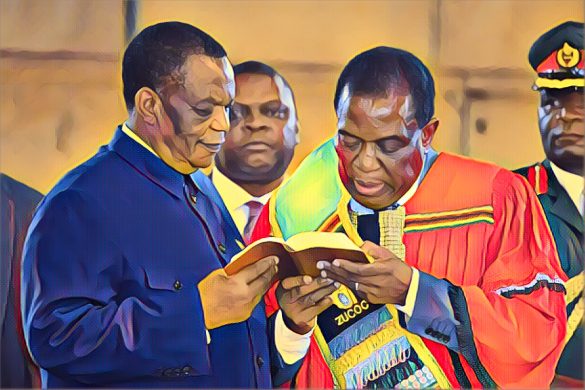In recent events, controversial businessman Wicknell Chivayo donated US$1 million to a church during an Easter service, raising concerns about political exploitation within religious institutions.
The scene unfolded dramatically as a helicopter descended at Nehemiah Mutendi’s Zion Christian Church (ZCC), disrupting the tranquility of the Sunday morning service. This unexpected visitor, Chivayo, later made a significant donation to the church, echoing a trend of ruling party officials using such gestures to sway support, particularly during election periods.
Zanu PF politicians have been observed attending church events, often clad in religious attire, and disregarding church protocol. This tactic of leveraging religious sentiment for political gain has drawn criticism from analysts who view it as a manipulation of sacred institutions for partisan interests.
Commentators like Romeo Chasara and Ruben Mbofana have voiced concerns over Zanu PF’s exploitation of churches, citing the party’s history of clinging to power through undemocratic means. They argue that churches, with their large congregations and loyal followings, are seen as ripe targets for political maneuvering.
Ahead of the 2023 elections, some church leaders have pledged support for President Mnangagwa, with initiatives like Pastors for ED mobilizing votes for the ruling party. Apostolic sects, representing a significant portion of the population, have pledged millions of votes for Zanu PF, allegedly in exchange for favors like cash, land, and vehicles.
Political analyst Maxwell Saungweme highlights Zanu PF’s strategic targeting of churches, tapping into the influence of spiritual leaders to garner support. Meanwhile, Zanu PF officials maintain that their engagement with churches is merely a demonstration of respect for freedom of religion.
However, concerns persist over the politicization of religion, a trend not new to Zimbabwean politics. The late former President Robert Mugabe was known for his appearances at white garment churches, while disputes over the influence of prophets like Madzibaba Wimbo have underscored the intersection of religion and politics.
In light of these developments, the integrity of religious institutions and their role in shaping Zimbabwe’s political landscape are subjects of ongoing scrutiny and debate.
Source: Newsday


